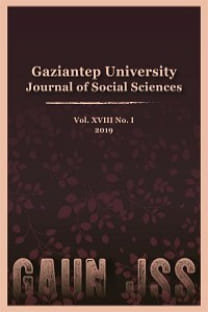Anne Baba Stres Ölçeği’nin Türkçe’ye Uyarlaması: Geçerlik ve Güvenirlik Çalışması
Bu araştırmanın amacı Abidin (2012) tarafından geliştirilen Anne Baba Stres Ölçeği (ABSÖ)’nin Türkçe’ ye uyarlamasının yapılmasıdır. Ölçeğin orijinalindeki faktör yapısının Türk kültürüne uygunluğunun belirlenmesi içi 386 anne baba üzerinde doğrulayıcı faktör analizi yapılmıştır. Ölçeğin geçerliğini belirlemek amacıyla çocuklarının yaşadığı psikolojik sorunlar nedeniyle psikiyatri servisleri, rehberlik ve araştırma merkezleri ve okul rehberlik servislerine başvuran anne babalar ile bu yerlerden herhangi birine çocukları için başvurmayan anne babalara ABSÖ uygulanmış ve grupların ABSÖ’den elde ettikleri puanlar arasındaki farkın anlamlılığı t testi ile değerlendirilmiştir.Ölçme aracının güvenirliği 55 anne baba üzerinde test-tekrar test yöntemi ile belirlenmiştir. ABSÖ’nün normal ve psikiyatri grupları arasında tüm alt boyutlarda anlamlı farklılık gösterdiği görülmektedir (p
Anahtar Kelimeler:
Ebeveyn, stres, ebeveyn stresi, uyarlama, ölçek, geçerlik, güvenirlik
Adaptation of Parenting Stress Index into Turkish: The Validity and the Reliability Study
The aim of the study is to make Turkish adaptation of Parenting Stress Index (PSI) designed by Abidin (2012). Confirmatory factor analysis was applied to 386 parents in order to determine the relevance between the factors in the original index and Turkish culture. In order to determine validity of the scale, the PSI scale was administered to both the parents who consulted psychiatry services, guidance and research centers and guidance services located in schools due to psychological problems their children experienced and the parents who did not consult any of these services and/or centers. Then t-test was used to examine the difference between the scores taken from the scale by these two groups. The reliability of the index was evaluated by test-retest method given to 55 parents. The results suggest that there are meaningful differences in all the subscales of the index for both groups (p
Keywords:
parent, stress, parenting stress, adaptation, index, validity, reliability,
___
- Abidin, R. R. (1982). Parenting Stress and Utilization of Pediatric Services. Children Health Care, 2. 40-73.
- Abidin, R.R. (1992). The Determinants of Parenting Behaviour. Journal of Clinical Child Psychology. 1992, Vol. 21, No.4, 407-412.
- Abidin, R. R. (2012). Parenting Stres Index. Fourth Edition. PAR. Lutz.
- Abidin, R. R. Turkish PSI. Yazara gönderilen elektronik posta. 30.06.2013
- Balcıoğlu, İ. (2005). Stres Kavramı ve Tarihsel Gelişimi. Medikal Açıdan Stres ve Çareleri Sempozyum Dizisi içinde; Ed. İbrahim Balcıoğlu. s 09-12. İstanbul.
- Belsky, J. (1984). The Determinants of Parenting: A Process Model. Child Development. 1984, 55:83-96.
- Bozkurt, T., Uluğ, M., Çelik A. T., Oktuğ, Z., İçellioğlu, S., Özden, M. S., Soysal, Ö. (2010). Stres. TC. İstanbul Kültür Üniversitesi Yayınları. İstanbul.
- Büyüköztürk, Ş. (2006). Sosyal Bilimler İçin Veri Analizi El Kitabı. İstatistik, Araştırma Deseni SPSS Uygulamaları ve Yorum. Pegem A Yayıncılık. Ankara.
- Büyüköztürk, Ş., Akgün, Ö. E., Özkahveci, Ö. Ve Demirel, F. (2004). The Validity and Reliability Study of the Turkish Version of the Motivated Strategies for Learning Questionnaire. Educational Seciences: Theory & Practice 4 (2), November 2004.
- Cahan, Y. (1990). A Study of Mothers Abusing Their Children- Their Stressand Maternal Social Support. Master Thesis. University of Hong Kong.
- Cole, D. A. (1987). Utility of confirmatory factor analysis in test validation research. Journal of Consulting and Clinical Psychology, 55(4), 584- 594.
- Deater-Deckard, K. (2004). ParentingStress. Yale UniversityPress. New Haven, CT, USA.
- Deater-Deckard, K.,andThe ALSPAC Research Team (1997). Parenting stress in different family contexts: A population study of intact, remarried, and single-mother families. Paper presented at the biennial meeting of the Society for Research in Child Development, April, Washington D.C.
- Glading, S. T. (2002). Family Therapy. History, Theory and Practice. Merril Prentice Hill. Ohio.
- Goldberg, S.,Janus, M., Washington, J., Simmons, R. J., MacLusky, I., and Fowler, R. S. (1990). Prediction of preschool behavioral problems in healthy and pediatric samples. Journal of Developmental and Behavioral Pediatrics, 18, 304-3013.
- Kirby, D. D. (2004). Parenting Stress. Yale University Press. New Haven and London.
- Kline, P. (1986). A Handbook of Test Construction:Introduction to Psychometric Design. (Çev. Nalan Sanlı). Methoen & Co. Ltd.
- Köknel, Ö. (1987). Zorlanan İnsan. Altın Kitaplar Yayınevi. İstanbul.
- Marsh, H. W., Balla, J. R., & McDonald, R. P. (1988). Goodness-of-fit indexes in confirmatory factor analysis: The effect of sample size. Psychological Bulletin, 103(3), 391-410.
- Santos, S. V. (1992). Portuguese Adaptation for School Age Children of the Parenting Stress Index: Preliminary Results. Revista Portuguesa de Psicologia, 28, 115-132.
- Senemoğlu, N. (1997). Gelişim Öğrenme ve Öğretim. Pegem Akademi Yayınevi. Ankara.
- Sümer, N. (2000). Yapısal eşitlik modelleri: Temel kavramlar ve örnek uygulamalar. Türk Psikoloji Yazıları], 3(6), 49-74.
- Tam, K. &Chan, Y. (1994). Validation of the Parenting Stress Index Among Chinese Mothers in Hong Kong. Journal of Psychology. Volume22, July 1994.
- Tarkka, M. T. (2003). Predictors of Maternal Competence by First-Time Mothers When the Child is 8 Months Old. Journal of Advanced Nursing, 41, 233-240.
- Ural, A. & Kılıç, İ. (2006). Bilimsel Araştırma Süreci ve SPSS ile Veri Analizi. Detay Yayıncılık. Ankara.
- White, C. (2003). Cognitively enhanced parent training. Behavioral and Cognitive Psychoterapy, Vol. 31, 99-102.
- White, T. RE:PSI-4 Turkish Translation. Yazara gönderilen elektronik posta. 19.07.2013
- Yavuz, R. (2005). Stres ve Kişilik. Medikal Açıdan Stres ve Çareleri Sempozyum Dizisi içinde; Ed. İbrahim Balcıoğlu. s 09-12. İstanbul.
- Yıldırım, A. & Şimşek, H. (2011). Sosyal Bilimlerde Nitel Araştırma Yöntemleri. Şeçkin Yayıncılık. Ankara.
- ISSN: 1303-0094
- Yayın Aralığı: Yılda 4 Sayı
- Başlangıç: 1991
- Yayıncı: Gaziantep Üniv. Sosyal Bilimler Enst.
Sayıdaki Diğer Makaleler
Akademik Motivasyon Ölçeğinin Türkçeye Uyarlanması
Cinsel Kompülsiyon Ölçeği’nin Uyarlanması
Anne Baba Stres Ölçeği’nin Türkçe’ye Uyarlaması: Geçerlik ve Güvenirlik Çalışması
Ali ÇEKİÇ, Turan AKBAŞ, Zeynep HAMAMCI
Türkiye'de Eğitim Politikaları Alanında Yapılan Lisansüstü Tezlerin İncelenmesi
Türkiye’de Eğitim Politikaları Alanında Yapılan Lisansüstü Tezlerin İncelenmesi (1989-2014)
Eyüp Bayram ŞEKERLİ, Soner TASLAK
Niğde'de Cumhuriyet Bayramı Kutlamaları
Niğde’de Cumhuriyet Bayramı Kutlamaları (1926-1948)
